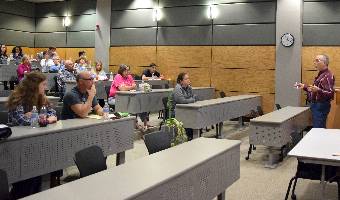March 8, 2017
MARCH LUNCH AND LECTURE FEATURES BEEKEEPERS ASSOCIATION
National Park College’s (NPC) Math and Sciences Division hosted the Greater Hot Springs Beekeepers Association for the March Lunch and Lecture Series. Fred Douville presented Honey Bees: Are They Here to Stay?
Douville is a beekeeper and a member of the Greater Hot Springs Beekeepers Association. He has a small farm in Pike County, Arkansas where he keeps 20 beehives in two different bee yards. He farms organically with his wife Julie who is in charge of bee products such as lip balms, salves and soaps. This year he will be completing the last year of his Master Beekeeper Certificate.
According to Douville, the honey bee population declined by 42 percent in 2015 alone. “One in three mouthfuls of food in the American diet is in some way a product of honey bee pollination,” he stated. “Bee colonies are collapsing at a rapid rate, and could potentially put our food supply at risk,” he added.
Douville discussed some of the causes for the decline of bee colonies, termed “Colony
Collapse Disorder”. He noted that honey bees are not an indigenous species of the
United States and therefore cannot be placed on the endangered species list.  He explained that in the 1980’s parasitic mites were introduced to the states from
Asian ships. He said hive beetles, wax moths, and fungi also have an impact on bees,
but the most influential factors include the varroa mite, changes to habitat, inadequate
forage and poor nutrition, new diseases such as Israeli acute paralysis, viruses,
and the gut parasite Nosema, and stress due to transportation.
He explained that in the 1980’s parasitic mites were introduced to the states from
Asian ships. He said hive beetles, wax moths, and fungi also have an impact on bees,
but the most influential factors include the varroa mite, changes to habitat, inadequate
forage and poor nutrition, new diseases such as Israeli acute paralysis, viruses,
and the gut parasite Nosema, and stress due to transportation.
He suggested a number of things people can do to help promote healthy habitat for honey bees. Planting pollinator friendly trees and plants is beneficial. Avoiding chemicals for lawn and garden use if possible is also important. He said people often weed flowers and dandelions from their lawn, but these bloom in early spring and provide important first food for bees after winter hibernation. Reporting bee swarms and hives that are in undesirable locations allow professionals to relocate them to a more appropriate habitat. Finally, Douville suggested that landowners diversify acreage with large plots of various bee forage.